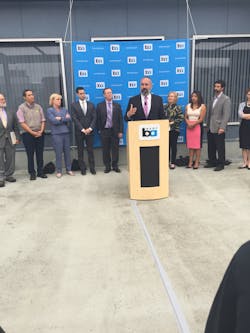BART Approves $3.5 Billion Capital Reinvestment Bond Measure
The bond measure is a key funding component of BART’s plan to rebuild and renew its aging system, which faces increasing problems as various physical parts of the 44-year-old railway reach the end of their useful lives. The plan replaces and repairs 90 miles of deteriorating tracks and other aging infrastructure in order to maintain BART's excellent safety record and protects our environment by keeping thousands of cars off the road.
“This bond measure is practical; it’s dedicated to fixing what we have,” said Board President Tom Radulovich. “We have a responsibility to keep our system safe and reliable while getting the maximum value out of taxpayers’ investment.”
Over the past year, BART’s community outreach department has held over 230 community meetings with local stakeholders and civic groups to ensure widespread understanding of BART’s needs, and to hear the public’s thoughts about its capital reinvestment program. At Thursday’s press conference following the crucial board vote, over a dozen Bay Area leaders appeared in support of BART’s decision to go to the ballot. Many told stories of what BART means to them, and how it plays an increasingly important regional role.
Thanks to record-breaking ridership, BART has been able to find funding for many of the solutions needed to increase capacity, meet modern demand, relieve crowding, and upgrade the system. That includes the newly arriving Fleet of the Future, the Hayward Maintenance Complex, and some of the groundwork for a cutting-edge train control system.
However, the cost of the capital projects needed to repair, fix, and replace worn rail, leaking tunnels, unreliable track circuitry, and failing power transmission equipment outpaces revenue growth. BART’s plan is to dedicate funds from the bond measure solely to fixing what we have first - without earmarks, pet projects, or frills. Estimates show the bond will cost Alameda, Contra Costa and San Francisco county homeowners less than a pack of gum a week - an investment that will show enormous returns in terms of improved safety, reliability, and decreased traffic.
If voters choose to pass the measure in November, great care will be taken to ensure the public’s money is protected and spent wisely. An independent audit committee will be commissioned to publish regular, transparent reports on how the money is being spent, with open, frequent and public meetings.
BART has proven itself to be a prudent and effective steward of public bond funds in the past, executing its 2004 Earthquake Safety and Retrofitting effort under budget with better and more robust results than expected.
Public transportation continues to be at the intersection of many of the great issues facing cities in the 21st century - and voters were wise in choosing to build such an extraordinary work as BART back in 1962. Since then, BART has been a staple of this region’s culture, workforce, and values. As both riders and service providers, BART appreciates and is deeply grateful for the opportunity to connect residents to the people and places they care about.
